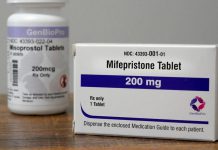Scotland is going to be the first country in the world to make period products like pads and tampons free after parliament unanimously passed the bill Tuesday.
Under the new legislation, the government of Scotland will create a program to make the period products accessible for those who need them.
The products will be available for free in all schools, colleges, and universities, which will be stocked in bathrooms. The Scottish government will also order other public organizations to do the same.
Monica Lennon, a member of the Scottish Labour Party, introduced the bill in April 2019.
She said, “The goal is to eliminate ‘period poverty’ so people have access to necessary period products.”
Just before the vote, Lennon told The Scotsman, a Scottish compact newspaper, that the law is increasingly necessary because the ongoing pandemic has made it difficult to access period products.
She said the next steps would be to end the stigma surrounding periods.
On Tuesday, Nicola Sturgeon, First Minister of Scotland and Leader of the Scottish National Party, said she was proud to vote for the historic bill, adding it is an “important policy for women and girls.”
A survey by the international children’s charity Plan International UK found that almost one-third of women in the U.K. aged between 14 and 21 have had difficulties accessing or affording period products during the COVID-19 lockdown.
Last year, the U.K. made period products free in all schools, but the COVID-19 pandemic affected that move with schools getting closed in lockdown.
The survey also found that at least 1 in 5 women reported difficulty accessing period products for reasons other than cost. Most women did not find the products in stores, while others were unable to leave home during the lockdown.
Last year, an American Medical Women’s Association (AMWA) report found that 35 states in the United States had what is called a “Pink Tax” or “Tampon Tax.”
The AMWA report noted that food stamps do not cover period products. It also noted that schools and prisons have started to improve access to period products. The article was originally published in Forbes.




















